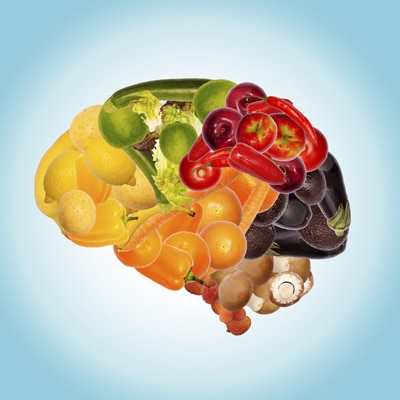
Dietary patterns and risk of Alzheimer’s disease
There is growing awareness that lifestyle factors, not just genetics, play an important role in the development of Alzheimer’s disease. However, compared with other major diseases, such as heart disease, research in diet and cognitive health is relatively new. So far, single nutrient, food or supplement studies have been disappointing, but as we don’t eat individual things, it’s more realistic to study dietary patterns.
The MIND diet
Indeed, researchers hope to come up with an optimal dietary pattern that will lessen the chance of developing the disease. One such pattern suggested is the MIND (Mediterranean-DASH Intervention for Neurogenerative Delay) diet. As the name suggests, it is a hybrid, based on the Mediterranean and DASH (Dietary Approaches to Stop hypertension) diets, both of which have been found in some studies to reduce the risk of cardiovascular conditions such as heart disease, hypertension and stroke.
The MIND diet includes many of the same dietary components as in the Mediterranean and DASH diets, such as the emphasis on plant-based foods and limited animal and high saturated fat foods. The MIND diet shares dietary components with its derivative diets, including nuts and beans, wholegrains, olive oil and a glass of wine a day. The diet also limits butter, fried or fast food and cheese. However the MIND diet more specifically captures foods and nutrients that reflect diet-dementia research. For example, it uniquely specifies berries, rather than fruit in general, reflecting an interest in the plant chemicals found in berries (with rather complex names such as anthocyanidins), that are thought to be positively associated with cognitive health. Similarly it specifies green leafy vegetables.
In observational studies, the MIND diet has been associated with reduced risks of cognitive decline and Alzheimer’s disease. These studies use a score (maximum of 15) to reflect adherence to the MIND diet comprised of:
- 10 ‘healthy brain’ foods:
- Green leafy vegetables;
- Other vegetables;
- Nuts;
- Berries;
- Beans;
- Wholegrains;
- Fish;
- Poultry;
- Olive oil;
- Wine.
- 5 ‘unhealthy brain’ foods:
- Red meats;
- Butter and stick margarine;
- Cheese;
- Pastries and sweets;
- Fried/fast food.
A study that looked at the effects of the three diets, Mediterranean, DASH and MIND on the risk of developing Alzheimer’s disease, found older people whose usual diet was close to any one of these dietary patterns, were less likely to develop Alzheimer’s disease than those eating less healthy diet patterns. The researchers say they found the greatest effect from the MIND diet, with participants who stuck strictly to it, reported to be 52% less likely to be diagnosed with Alzheimer’s disease.
Observational studies can’t show that the diets protected against Alzheimer’s, only that there seems to be a link between eating a healthy diet and a lower risk of getting Alzheimer’s disease. The three diets weren’t compared directly, so we can’t be sure which one is best.
What elements in the diet may be helpful?
Such research on diet and cognitive health are promising but the science on diet and brain health remains too inconclusive for specific recommendations on the prevention of Alzheimer’s. There is evidence though that some broad patterns – eating more plant based diets, more nuts, legumes, wholegrains and oils such as olive oil – may help cognitive health . So whilst many questions remain, we are seeing lots of common elements within diets that may be helpful.
Exactly why these eating patterns are good for brain health are still unclear – it may be that diets that facilitate the flow of blood to the heart, also help it flow to the brain. And certain nutrients may prevent inflammation in the brain or protect brain cells.
So whilst we can’t say which specific foods in the diets might make the difference, the best advice may be to follow a healthy, balanced dietary pattern, without worrying too much about exactly which foods might protect your brain. And to remember there are other lifestyle factors such as being physically active and not smoking that may also make a difference.



